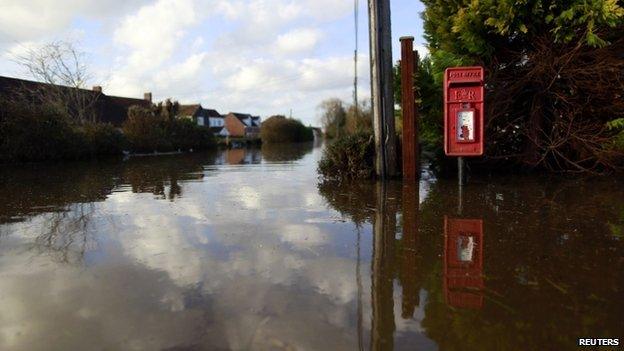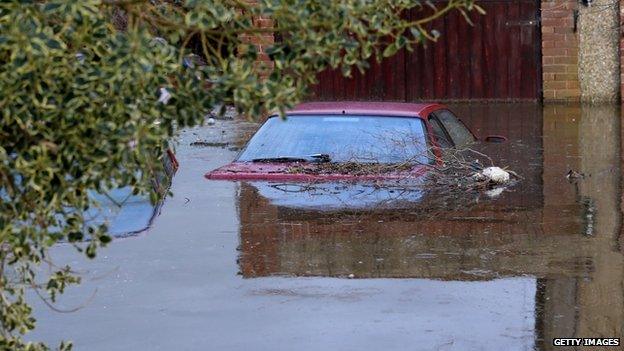UK floods: Damage 'could have been prevented'
- Published
The BBC's Duncan Kennedy reports on the UK's "most controversial" winter
Some of the damage caused by the recent floods could have been prevented if the correct water management techniques had been used, says a group of leading environmental and planning experts.
In an open letter, they urged the prime minister to adopt a clear strategy for future flood prevention.
The call came as shadow chancellor Ed Balls said a Labour government would make investment in defences a priority.
Downing Street said it was spending more than ever before on protection.
It comes a day after the Met Office confirmed the UK had seen its wettest winter in records since 1910.
Two severe flood warnings remain in place, external on the Somerset Levels, which has been one of the worst-hit areas, with prolonged flooding since the severe weather began in December.
There are 70 flood warnings, and nearly 120 less serious flood alerts, currently in place across England and Wales.

The experts said a conference should be convened to discuss how to avoid a repeat of the recent floods
The Environment Agency has warned that with more unsettled weather on the way, the risk of flooding could be slow to disappear.
'Salami-slicing'
In the letter to the Daily Telegraph, external, experts from 17 environmental and planning organisations - including landscape architects, engineers, hydrologists and ecologists - made a plea for the government to listen to them when it came to devising a flood defence policy for the future.
"While we are pleased to hear that the prime minister will provide leadership and funding, it is essential that government actions are based on best practice developed over many years," they said.
"Water management techniques could have helped prevent the effect of flooding on villages, towns and over surrounding land seen recently.
"Emergency measures are in order for the immediate crisis. But in the long term, the management of water requires a clear strategy."
They suggested measures to cut the risk of future flooding, including:
Use of forestry and land management to hold back water in the upper reaches of rivers, as well as dredging for the lower reaches
Fitting sustainable drainage systems on existing buildings and new buildings
Buildings and land that cannot be properly protected should be made to withstand flooding
All new housing on flood plains must be resilient when built
More co-operation between experts, the water companies, internal drainage boards, local authorities, the Environment Agency, and Natural Resources Wales, as well as between them and landowners or residents
Sue Illman, president of the Landscape Institute - one of the 17 organisations behind the letter - said the UK had a "legacy of not addressing the long-term problems" of flooding.
Speaking on BBC Radio 4's Today programme, she said "long-term, sustained investment" was needed throughout river catchment areas to prevent problems.
She said the measures to be considered included "catchment management techniques" such as flood alleviation streams, as well as "sustainable drainage systems" in towns and cities.
When asked about the letter's claim that some of the recent flood damage could have been prevented, she said: "We couldn't have stopped the damage because I think we all understand that what's happened has been absolutely exceptional."
The letter urged David Cameron to hold a cross-departmental conference, similar to one set up to deal with ash dieback, and to include Whitehall departments, the Environment Agency and other experts to prevent a repeat of the scale of damage caused by recent floods.
Writing in the same newspaper, external, shadow chancellor Ed Balls accused the government of "short-termist salami-slicing" of budgets for flood defences.
He claimed 300 "shovel-ready" flood defence projects were shelved last year because of a lack of funding.
"Of course, if Labour wins the next election, there will need to be spending cuts... But how we make those cuts is vital," he said.
"Our zero-based review of public spending - a root-and-branch review of every pound spent by government from the bottom up - is clear that we must eliminate waste and inefficiencies, but also prioritise preventative spending that can save money in the long term.
"There can be few better examples than investment in flood defences."
Spending on defences was boosted after the 2007 floods, Mr Balls said, but the coalition government then cut it by 17% in real terms in 2010.
"Rather than the short-termist salami-slicing of budgets we have seen, we need instead to make long-term decisions now that can save money in the future," he said.
Grant scheme
In response to the letter, a Downing Street spokesman said: "We are looking at all potential options to tackle flooding and are spending £2.4bn on flood management and protection from coastal erosion. That is more than ever before.

Flooding in some areas, including the Somerset Levels, has caused damaged homes and other property
"We have already announced a record level of capital investment at £370m in 2015/16 rising to over £400m in 2020/21 as part of our long-term plan to improve resilience.
"We need to employ a range of techniques to alleviate flooding, including dredging in some areas.
"We will look at the lessons to be learned to see where additional flood protection can help."
On Thursday, Mr Cameron announced the government's scheme to provide grants for homeowners in England hit by the floods would begin on 1 April.
Claimants will be eligible for payments of up to £5,000, to help cover future protection for properties.
